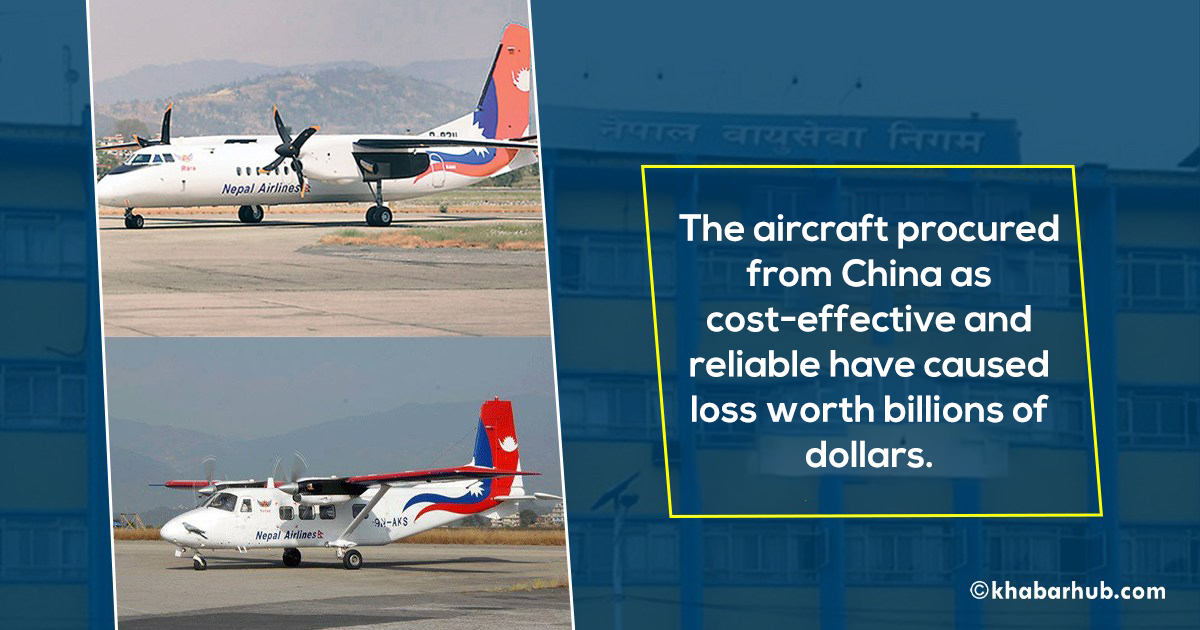KATHMANDU: Nepal Airlines Corporation (NAC) has been reeling under hard times owing to the evil eyes of corrupt politicians, inefficient ministers, and its staffers.
The series of scams have resulted in the continuous downfall of NAC lately. The shrinking service range, declining number of aircraft, and the irresponsible management all are contributing to the collapse of the organization.
The Corporation that has fallen into the vicious circle of piles of hazards and scams is facing the worse due to the Chinese planes it procured 5 years ago. The aircraft procured as cost-effective and reliable have caused loss worth billions of dollars.
Concluding that the planes caused loss worth Rs 1.9 billion in five years, the corporation has decided not to operate 6 Chinese aircraft from July 30.
The meeting of Board of Directors of NAC held on June 30 decided to cancel the flights of 2 aircraft received in grant and 4 procured by the Corporation itself.
According to Archana Khadka, the spokesperson of NAC, the corporation has to forebear Rs 1.9 billion in five years.
Besides, NAC has a loan worth 3.14 billion it arranged to procure these planes. The sum of the loan and the loss exceeds 5.4 billion rupees.
Aircraft and loss and loan they caused
According to NAC sources, two MA60 planes have a loan of more than Rs 1.65 billion. Similarly, there is a loan worth more than Rs 1.36 billion taken for Y12 planes. The NAC has four Y12 planes.
In addition, there is debt worth Rs 120 million the corporation took for custom clearance. Thus, there is a debt worth more than Rs 3.14 billion for the 6 Chinese aircraft.
Similarly, NAC has borne the loss worth more than Rs 1.90 billion from the Chinese planes in which the loss from four Y12 planes is more than Rs 726.33 million. Likewise, two MA 60 aircraft have caused a loss worth Rs1.18 billion.
NAC Board decides to halt flights via Chinese planes
According to NAC Spokesperson Khadka, NAC’s Board of Directors has decided to stall all the operations via Chinese aircraft from July 30 as these aircraft have caused a remarkable loss to the corporation.
She informed that the decision has been sent to the Ministry of Culture Tourism and Civil Aviation.
“NAC has submitted the decision including the details relating to the cause of stalling the operation,” spokesperson Khadka said, “We will do whatever the line Ministry directs us to do.”
Achyut Raj Pahadi, a member of the Board of Directors of the Corporation remarked that the Board decided to stall the operation as the crafts are not fit for operation for various reasons.
“We have written to the Ministry that it’s not safe to operate service through these planes,” Pahadi said to Khabarhub, “It’s better not to operate them.”
Rudra Singh Tamang, the spokesperson of the Ministry of Culture Tourism and Civil Aviation informed that he has got the information that NAC has decided not to operate service through those planes.
“I have come to know that the NAC Board has decided not to operate services through the Chinese planes, yet I have not got the formal decision of the Board to date,” spokesperson Tamang said.
According to Tamang, NAC designs the action plan and decides about the plane management as well.
However, NAC officials say although the NAC Board decided not to use Chinese flights for operations whether to sell or let the planes go on the lease will be decided after the government decides and directs NAC to act on it.
NAC decided to halt Chinese planes for these reasons
According to NAC sources, the main reason behind the decision to stop the service via Chinese planes is the loss NAC has to bear on their behalf.
“All these 6 planes are not worth operating,” member of NAC’s Board of Director Pahadi told Khabarhub, “Nowhere in the world are such planes procured except through G2G process.”
Among other reasons is the lack of enough trained pilots for Y12 planes, the high training cost it cost four times more than of Twin Otters.
Not only this, but the simulator training cost of MA 60 is also 78% more than of other planes and type rating training is 50% more than other planes.
Nearly 30% of payload restriction in other operating sectors except Kathmandu is also a factor influencing the decision to stall the operation of these Chinese planes.
There is a problem with the engineering of these planes as well. According to NAC sources, although NAC has enhanced the capacity of maintenance for support from OEM, the constructors are still required for some more works.
However, due to the lack of cooperation from the plane manufacturing company, NAC has to undergo the loss.
Similarly, although NAC got some spare parts, most of the spare parts are not in the international market as they are manufactured in China alone.
There is a problem in full maintenance of Chinese parts as the Civil Aviation Authority has enforced the provision of validation requirements in the repairing stations.
As the inventory requirement for the maintenance of the structure is different from other planes, the inventories, tools, hardware maintenance of Chinese planes are relatively more expensive than others.
This is how the Chinese planes were procured
The Council of Ministers of then Prime Minister Dr. Babu Ram Bhattarai had decided in 2012 to procure 6 Chinese planes. After this decision, the proposal was forwarded through Ministry of Finance rather than sending it through the line Ministry i.e. the Ministry of Culture, Tourism and Civil Aviation.
On the basis of the proposal, it was decided that the financial aspect related to the proposal would be considered by the Ministry of Finance whereas NAC in coordination with the Ministry of Culture, Tourism and Civil Aviation would study the technical aspect of the deal.
Based on the same understanding, the Khil Raj Regmi-led government decided to procure six Chinese planes in 2013.
Soon after, a bilateral agreement was made to procure 4 planes in soft loan whereas one MA60 and one Y12 planes would be provided as a grant by the Chinese government.
As per the agreement, NAC had procured Chinese planes at Rs 6.671 billion as a soft loan. Out of the total amount, Rs 2.943 billion was grant aid whereas Rs 3.72 billion was the loan at the annual interest rate of 1.5%.
According to Board member Pahadi, the planes were procured despite knowing the fact that they would cause a loss to NAC.









Comment